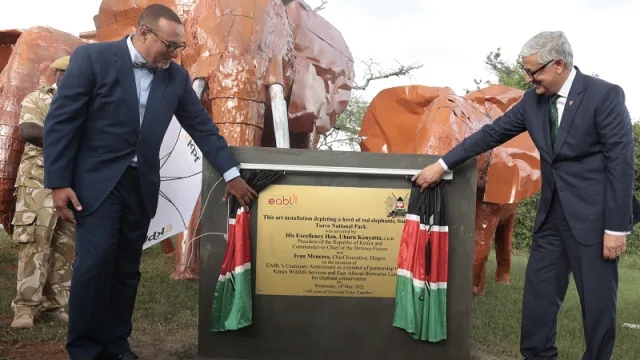EABL to the rescue of jumbos in Sh100 million plan

EABL to the rescue of jumbos in Sh100 million plan
The East African Breweries Limited (EABL) has entered into a Kes100 million agreement with the government to enhance the conservation of elephants in Kenya's game parks and reserves as the company toasts 100 years since its establishment.
In a ceremony attended by Tourism CS Najib Balala and Diageo CEO Ivan Menezes, EABL’s Group Managing Director Jane Karuku said the funding underscores the company’s commitment to sustainability efforts in the East African market.
According to government statistics, Kenya's game parks, wild reserves as well as conservancies provide a home to roughly 36,300 elephants.
Last year, the International Union for Conservation of Nature (IUCN) warned that Africa's elephant population was being decimated by poaching and wanton destruction of their habitat.
The controlled shooting of the jumbos, swirling human settlements, and poaching have steadily eliminated elephants from certain areas in Kenya.
"Conservation is deeply stitched in EABL’s history not only because our first brewery was set up as a riverside operation 100 years ago in Ruaraka, but elephants are also core to Tusker, our iconic beer brand. We believe this is one of the biggest single investments in addressing conservation efforts and will go a long way in saving these animals currently facing the biggest threat, due to poaching,” Ms Karuku noted.
Read also: Fresh excise tax on hospitality sector will sabotage post-Covid-19 jobs recovery
The Kenya Wildlife Service (KWS) is reportedly enhancing anti-poaching measures to eliminate illegal trade in ivory by among others involving local communities in wildlife management.
From a single brand – Tusker – brewed by brothers Charles and George Hurst in 1922 to over 100 brands currently, EABL has evolved over the last century, becoming the biggest provider of alcoholic beverages across East Africa and beyond.
"As we mark this centenary, we are toasting the growth of our business and brands – and the positive impact on our communities, creating shared value," she added
Speaking at the centenary gala at The Nairobi National Park, Diageo CEO Ivan Menezes said the company is proud of EABL’s incredible history, tradition, and business in East Africa, with Kenya contributing the biggest of our presence in this region.
EABL is a subsidiary of a British multinational beverage alcohol company, Diageo, which is the world’s largest spirits business.
“EABL is a jewel of a business, with a fantastic 100-year heritage. But its impact across East Africa, where it is creating employment for over two million people, directly and indirectly, demonstrates more vividly what this business can do for the next century. In Kenya, EABL has the potential to expand its 47,000-strong farming community, earning Kes1.2 billion annually to the next level. As part of the Diageo family, we are proud to be associated with this business.”
He added: “We have a responsibility as a local manufacturer and employer to grow our business sustainably and with this significant investment, EABL will extend its past efforts in safeguarding Kenya’s water towers, national parks, and game reserves in Kenya.”
The brewer is banking on a sustainable business model to drive growth in the next 100 years.
Over the last decade, the company has planted over 1.3 million trees around the country with a success rate of 85 percent – and EABL hopes to double that number by 2030.
To support the company’s transition to low carbon operations, EABL has facilitated an over 20 percent cut in greenhouse gas emissions in the last two years alone.
Ms. Karuku said: “We have recently invested in a new Kes5 billion biomass plant, one of the biggest in the region, and its completion soon will help us achieve Net Zero status reducing our carbon emissions by 48,000 metric tonnes annually. In addition, water stewardship is a long-standing strategic priority and our goal in Kenya is to replenish 1.6 million cubic metres by 2026 across all our three sites in Kenya.”



